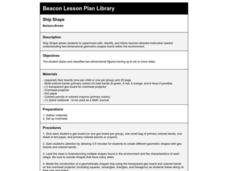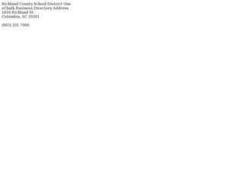Curated OER
Volume of Spheres
Students find the volume of spheres. For this geometry lesson, students measure and derive the formula for each shape and solid. They use the correct terminology and units when solving these problems.
Curated OER
Shapes are Everywhere
Second graders gain an understanding of geometric shapes and spatial reasoning. They learn the attributes of solid shapes in everyday activities. Students compare geometric shapes to everday objects, finding things that serve a purpose...
Curated OER
Geo Jammin' By DeSign - Day 3, Lesson 14: Mirror, Mirror on the Wall
Students explore characteristics of symmetry, write a definition, and locate the line of symmetry on a shape.
Curated OER
Dilations of 2 and 3 dimentional figures and their effect on area, surface area, and volume.
Seventh graders investigate the area and volume of 2D and 3D figures. In this geometry instructional activity, 7th graders create a storyboard explaining their knowledge of 2D and 3D shapes. They analyze their data and interpret...
Curated OER
Math Who Am I?
In this math terms puzzle instructional activity, students read the description for each math term. Students try to guess what each term is. Students circle the third letter in the box to check their answers.
Curated OER
Visualizing Multiplication
Upper graders represent multiplication of a two-digit number by a two-digit number as the area of a rectangle with dimensions of the two factors. They find patterns for the number of different base ten blocks in a rectangle representing...
Pennsylvania Department of Education
Problem Solving with Fractions
Solve story problems using fractions or decimals. Then, determine the reasonableness of answers using estimation.The detailed instructional activity includes essential questions, vocabulary, a materials list, and links to related units.
Curated OER
Identifying Faces, Edges, and Vertices
Fourth graders examine faces, edges, and vertices. In this geometry lesson, 4th graders participate in classroom activities that require them to compare geometric shapes, figures, and models.
Curated OER
Geo Jammin' By DeSign - Day 1, Lesson 1: Math in Motion
Second graders, through large screen monitor, study geometric design. They participate in a diagnostic assessment in which they use pnecils, scissors and paste.
Curated OER
Geo Jammin' By DeSign - Day 3, Lesson 15: The Quiltmaker's Gift
Students listen to a read aloud of The Quiltmaker's Gift by Jeff Brumbeau finding examples of symmetry in the illustrations in the book.
Curated OER
Geometry Shapes Playground Safety
Students create a new playground design to present to elementary students during Playground safety week. They review basic geometry to use in observing and recording the equipment on a local playground. They research playground safety...
Curated OER
Sort It Out and Match It Up
Young scholars identify objects that are the same shape and size. They compare and contrast attributes of two-and three-dimensional objects using appropriate vocabulary. Pupils justify an extension of a geometric pattern to explain...
Curated OER
Our Tangible World is Full of Dimensions
Sixth graders explore characteristics of two and three-dimensional figures. They observe the teacher demonstrate the faces, edges, vertices and names of specific figures. In groups, 6th graders examine and describe given figures. ...
Curated OER
Ship Shape
Third graders experiment with, identify, and follow teacher-directed instruction toward understanding two-dimensional geometric shapes found within the environment. Groups of students utilize geoboards to help them explain geometric shapes.
Curated OER
Construct Figures to Find Specific Volume
Sixth graders use number cubes to explore volume of two-dimensional shapes. They roll a die and construct a shape using the numbers rolled as measurements of the sides. They estimate the volume of a given object, and then use the...
Curated OER
Foil Fun
Second graders be having hands-on experiences with three-dimensional solid shapes. They investigate the features of solid shapes and examine the names for them. They are introduced to making nets for 3D shapes.
K12 Reader
Basic Geometry Terms
Set your pupils up to start on geometry by teaching them some introductory terminology. Pupils learn the terms by reading a short passage and looking at examples. They then respond to five questions related to the text.
Noyce Foundation
Parallelogram
Parallelograms are pairs of triangles all the way around. Pupils measure to determine the area and perimeter of a parallelogram. They then find the area of the tirangles formed by drawing a diagonal of the parallelogram and compare their...
Noyce Foundation
Which is Bigger?
To take the longest path, go around—or was that go over? Class members measure scale drawings of a cylindrical vase to find the height and diameter. They calculate the actual height and circumference and determine which is larger.
Charleston School District
Applications of the Pythagorean Theorem
Use patterns to your advantage! The Pythagorean Theorem allows learners to find missing sides of right triangles. Problems include those with both rational and irrational lengths.
Creative Educator
Dream Room Design
Using the Twist™ application, elementary schoolers design their dream room. They follow the prescribed steps to calculate width, length, perimeter, and surface area in order to create a 2-dimensional representation of their dream room...
Curated OER
Quilt Squared
Students study West Virginia quilts. In this mathematics lesson, students use symmetry, geometric shapes, and patterns to create their own quilt square.
Curated OER
A World of Symmetry
Students identify lines of symmetry. In this symmetry lesson, students create objects and identify their lines of symmetry. They answer questions about lines of symmetry. Students cut shapes out of cookie dough and...

























